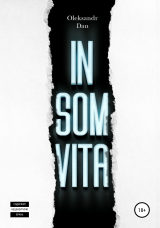
Текст книги "Insomvita"
Автор книги: Oleksandr Dan
Жанр:
Прочие приключения
сообщить о нарушении
Текущая страница: 3 (всего у книги 7 страниц)
Chapter 3
15 December 2011. 15:45 Geneva, Switzerland
Trevor was sitting on the veranda of a busy restaurant watching an elderly couple talking quietly at the table near the entrance. He was amused by how the man was stealthily feeding a small dog that was sitting under the table.
Trevor flipped through a fresh newspaper, trying to find the latest news on the Woud trial, but seeing nothing asked the waiter for the bill. That was when the encounter happened that turned his life upside down, inadvertently exposing that part of him which he had not even guessed existed.
Trevor was surprised to hear someone speak in Serbian. A man and a woman, clearly tourists, were talking to one another. They had two children with them, close to the age of seven. The man’s voice sounded familiar. Trevor was ready to swear that he knew the man well. He shoved the newspaper aside and stared at the retreating silhouettes of the family. The woman was walking ahead, holding the children by their hands. The man was inspecting the cobblestones engraved with the names of cities, incidentally turning towards Trevor. He was a short, stout man, about fifty, balding, with thick glasses, and dressed in a well-worn but clean suit and an oversized navy raincoat.
Suddenly it dawned on Trevor that he knew the man. He got up and shouted in Serbian: “Jovan? My friend, Jovan, it is you!”
The man glanced back. His wife also noticed the stranger who was loudly calling after her husband. Both children immediately clutched their mother.
“Jovan, hey! It’s me, Trevor. Don’t you recognize me, old man?”
“Teo?!” the man responded, throwing open his arms. “Trevor! Well, I didn’t expect to see you here! It’s been a while! It is a small world, I guess!”
The friends hugged tightly.
“I thought I’d never see you again,” said Trevor. “How long has it been? Ten? Twelve years?”
“Teo, fifteen years at least! You were serving in the Legion back then,” Jovan responded slowly, tears of sincere joy fogging his glasses. “I forgot how you look. Let me see you!”
Jovan wiped his glasses and after putting them back, he scanned Trevor. Grabbing his shoulders, he joyfully exclaimed: “You are a real badass, and you still look cool. Haven’t changed a bit! Right, Anna? This is Trevor… Teo, a friend I once told you about."
Jovan’s wife held out her hand and gave Trevor an appraising look.
Anna was a tall, slim, conventionally attractive woman with no makeup, dressed in a cheap grey coat and long black skirt, which could not hide her aristocratic posture. Trevor took immediate notice of her wonderfully manicured and well-cared-for hands, although he was taken aback by her contrasting appearance.
“Well, you were also once a tall, handsome guy with green eyes and thick dark hair,” she joked, lightly stroking Jovan’s bald spot. “As far as I know from what my husband told me, you are the same age, and were thick as thieves many years ago.”
Anna spoke Serbian well, but with a slight Russian accent. She looked, maybe, ten years younger than Jovan and seemed unnaturally guarded; even her joke sounded forced to Trevor.
“Jovan, you talked about me?” Trevor said, and immediately offered: “Friends, let’s sit on the terrace. My table is free, as if it was waiting for you.
“Yes, I spoke a lot about us, my friend,” answered Jovan as he sat down at the table. He turned to his wife and continued: “Honey, we have been friends since we were twelve. Oh, the trouble we got into! We even planned to serve in the Legion together. Right, Teo? I didn’t pass the medical then, but we did dream to be together always. By the way, how long are you here for?”
“A couple of days. I wanted to spend Christmas somewhere in the mountains, close to the snow, because I don’t think we’ll have snow here this year.”
“Yeah, it’s pretty warm for December. Well, Trevor, tell me what you are up to these days?” Jovan smiled.
But Anna took Jovan’s hand and said: “Honey, you stay and catch up with your friend and the boys and I will take a walk along the waterfront. I’m sure you will have fun without us.” She stood up.
As Trevor was helping Anna with her coat, he noticed a small piece of paper stapled to the inside of the collar. It was a receipt with a drycleaner’s number. Jovan had the same receipt stapled to his coat. Trevor thought about it for a moment, but Jovan’s voice distracted him.
“A fine woman, isn’t she?!”
“Yeah…” he replied hollowly and glanced at Anna’s retreating form. Both kids dragged their feet after her and soon all three were lost in the crowd on the square.
“You can’t imagine how lucky I am with her. We’ve been together for ten years.
“Is she Russian?”
“No, Serbian, but lived all her life in Catalonia. Ok, enough about me. How are you? Married? What about work?"
It really had been a long time and they did have a lot to talk about.
Trevor met Jovan in the early 1980s, at school in Paris, where Jovan’s Serbian family had moved from Yugoslavia, having fled Kosovo after the 1981 clashes. As a kid, Jovan would often tell Trevor about those events, when crowds of refugees traveled from Kosovo to Serbia, leaving behind their houses and villages because of Albanian nationalists. Albanians had burned the village where Jovan’s family lived to the ground, turning hundreds of people into refugees.
Trevor befriended Jovan the moment he crossed the school’s threshold. At first, Trevor felt sorry for the modest, quiet and always hungry boy, who spoke very poor French. After some time, however, they became the closest of friends. Jovan was a frequent guest at the house of Aunt Anne Frachon.
After graduating from high school, the friends decided to enlist together in the Legion, but Jovan, who was a tough-looking young man, unexpectedly failed his medical exam and got the “unfit for military service” stamp because of flat feet. Their paths diverged shortly thereafter.
They stayed at the restaurant till late and then went to a small hotel on the other side of Leman[9]9
Leman (French: Lac Léman, Le Léman, Lac de Genève) is another name for Lake Geneva.
[Закрыть], where Jovan was staying with his family. They stopped on Mont Blanc Bridge, which connected the two halves of the city, admiring the restless surface of Lake Geneva.
The night city sparkled with colorful lights that were reflected in the iridescent water, like in a Van Gogh painting. The fountain that pushed a thick 40-meter stream of water into the sky proudly stood over a small man-made cape.
“Teo, you know, we are not here on vacation,” Jovan said after a moment of silence. He shifted his gaze away from Trevor as he spoke, pretending to stare at the dark waters of the lake. “I’m here for psychological adaptation after treatment for alcoholism.”
The roar of the fountain muffled Jovan’s words, but he continued, a bit louder: “This is the third time I’ve been in treatment, Teo. The third time! But today is 94 days that I’ve been sober. There is a very good psychologist here in Geneva who is helping me. I come here once every three months for a week. I have a session every morning.”
Trevor stared at him in silence.
“Life is not an easy thing, Teo! You dream about one thing and get something totally different,” Jovan continued bitterly. “I got somehow sucked into it. But now I hope that I’m done for good. There is this young woman, a great psychologist, who can induce a state of hypnosis, and she helped me. I was referred to her after I had lost almost everything. I was living alone by that time and practically homeless. Now, things are looking up again.”
Trevor decided to change the subject, as he could tell how hard it was for Jovan to open his heart to him. Yet Trevor felt uneasy.
“Jovan, do you recall how we went to see that touring hypnotist? Remember, we were the only ones he was unable to hypnotize and we were asked to leave the club?” Trevor smiled and continued: “Ever since then I have been convinced that I am immune to hypnosis and other such types of suggestion.”
“Trevor, you don’t understand. She’s got incredible skills! And her looks…” Jovan winked at Trevor and continued: “I can introduce her to you, if you want. She's an incredible woman in every sense. I have my last session with her tomorrow morning. By the way, she is classy and she is single.” Jovan pronounced the last word with a knowing tone and winked.
A real hypnotist, thought Trevor. A classy woman and a good psychologist. Seems like too many praises for one person.
“How about your job? I think I remember you wanted to be in politics,” Trevor said, again trying to change the subject. Then he seemed to remember something: “I think you went to Moscow State Institute of International Relations?”
“Yes, I graduated with honors”. Jovan nodded. “You have a great memory, my friend. After I graduated, I worked, got married, had two children, and joined a small law firm in the center of Prague. The calm, measured life relaxed me and I almost ended up losing everything. But I hope that’s all in the past now.”
“Yes, Jovan, life has a tendency to adjust our plans. Sometimes it seems we are simply watching life go by. So, you are saying you leave tomorrow? When?”
“We leave by train at midday, right after the session. We’ve rested, fortified our constitutions, so enough, duty calls. This time tomorrow, I’ll be in Prague, but don’t worry, we will speak tomorrow. The most important thing is that we found each other,” replied Jovan, patting Trevor on his shoulder.
“Right, and I am really happy we did. It's kinda weird that we so unexpectedly…”
“You have some business in Geneva?” Jovan asked. “Are you here alone or with somebody?”
“No, Jovan. I’m done with business for the year. I’m vacationing here. By the way, now's a good time for some decent brandy.” Trevor pointed towards the downtown. “Let’s go, I know a great place here. You won’t drink, I know, but you can keep me company.”
“No, Teo,” Jovan protested. “I’d love to, but I keep a strict schedule. I must be in bed in 30 minutes, and preferably on an empty stomach.”
“Well, if you have to, I won’t keep you.” Trevor smiled. “I wanna hang out a bit longer. I like the liveliness of the city. Besides, I’ve been having trouble sleeping lately.”
“That’s another reason to speak to a good psychologist,” Jovan said happily. “You just need to reboot your brain. You will sleep like a baby after the first session with her. What have you got to lose? An hour of relaxation and you will feel better right away.”
“Fine, Jovan,” Trevor answered after a moment’s thought. “Have it your way. I’ve got time anyways. Let’s go to her tomorrow. When is your session?”
“Okay, look, it starts at 9am and lasts not more than 40 minutes. I will schedule you for 10 am and wait for you there. Sound good?”
“Sounds good,” agreed Trevor and hugged his friend goodbye. “Let’s see your ‘classy woman’. By the way, Jovan, what’s her name?”
“Amanda. Her name is Amanda.”
The two friends bid each other farewell and agreed to meet the next morning at Rue du Cendrier 19.
Chapter 4
16 December 2011. 17:15 Prague, Czech Republic (Robert)
"Insomvita[10]10
Insomvita (Latin “in” – “into”, “upon”, Latin somnum – “dream”, and Latin vitae – “life”) – life in the dream.
[Закрыть]? A life in dreams? Right… Interesting… Very interesting… Ahem… Insomvita… Is this your own idea or did somebody put you up to it?” a man in his sixties in a white coat and a thin gray beard said as he examined Robert. He paused and stared into Robert’s eyes, half-smiling in distrust. “Mr. Blanche, if everything you are saying here is true and there is not a hint of deceit, then you are a true discovery for a psychiatrist!”
Dr. Alexander Friedman did not look one bit like a psychiatrist. To Robert, a psychiatrist was a serious, stout man in an expensive suit, with the neat hands of a piano player, high forehead and wide, neatly trimmed beard up to the ears. But the man standing before Robert was short, skinny, and elderly, with a small, carefully trimmed beard and a closely clipped moustache. His face, streaked with a web of thin wrinkles, was well cared for, small and feminine by most metrics. His gray hair was neatly cut and combed back in long streaks.
The doctor was very nimble. When he spoke, and he spoke very quickly, his hands flew in a flock of gestures. At the same time, his enunciation was precise and he spoke every word very clearly.
The psychiatrist followed his examination ritual, going from eyes to tongue and throat, massaging hands and lightly swinging the reflex hammer against the knees.
“Everything seems to be in order! Do you take antidepressants? Do you suffer from migraines?”
“No. I’ve never needed antidepressants and I hardly ever take pills,” Robert answered. “For a migraine, I don’t even know what to say. I don’t remember the last time I had one.”
“What about your sleep? Maybe you suffer from insomnia?” The doctor was clearly confused and did not try to conceal it. “You look a bit fatigued."
“Doctor, I sleep like a baby. I can sleep anywhere and in any position.” Robert smiled. “I just got back from a business trip. Haven’t slept for nearly 24 hours – different city, the flight."
“Exhaustion? Sleep deprivation? You work a lot?”
“No, doctor. I'm fine. The question is totally different. I want to know if you’ve seen anything like this before?”
“Did you use to take drugs? Smoke pot?” the doctor continued his interrogation, ignoring Robert’s question.
“Doc, nothing like that. I even have alcohol intolerance. So, I almost don’t drink and I’ve never smoked.”
Robert tried to speak in a steady, calm voice to convince the psychiatrist as his eyes bore into Robert during this interrogation.
“Right…right…right… Oh, got it! Have you been to a doctor with this issue before?
“I’ve already told you that I’ve never been here. Amanda recommended that I see you. She was the one who suggested it."
“Right…right…right… Amanda," the doctor drew out, ignoring Robert’s last words. He got up and began to examine his head again. “You say that you've not had any head trauma. What about when you were a child? Maybe intense stress, mental disorders, phobias, some juvenile anxiety?”
“No, doctor, nothing like that. Actually, I don’t think I’ve ever been seriously ill.”
The psychiatrist looked at Robert in the eyes and resumed feeling around his head. His fingers, like a massage device, slid pleasantly through his hair, leaving no inch of the patient’s skull unexamined.
“If this helps, doc… I don’t know whether it’s a phobia, but I feel really uneasy on a train.”
The doctor continued to ignore Robert and probe his head.
“Why is that, do you think? As far as I know, trains are the safest mode of transport.”
He suddenly stopped, still leaving his hands partially buried in Robert’s skull, leaned in close and quickly asked: “Why are you so scared of the trains?”
“It’s because of the rail crash at Ladbroke Grove in London."
“Ok, tell me about it,” the psychiatrist said.
“This was a long time ago, in October 1999, I think. In the morning, right before getting on the train in Reading, I suddenly felt very sick, right on the platform. I experienced severe dizziness and I thought I was about to lose consciousness. And then I had a vision. I saw myself lying among the dead in the wreckage of a train carriage filled with mangled corpses. I could even feel the heat of the fire on my face that engulfed the carriage. Then suddenly I heard a clear voice in my head instructing me not to get on that train. In the evening, I was watching the news and saw the horrifying rail crash that happened at the fourth kilometer from Paddington Station. Two trains had collided, killing over thirty people and leaving more than five hundred injured. And the first car, which I was supposed to board, suffered the worst."
“Paddington rail crash,” Dr. Friedman said. “I remember reading about it.”
“Right. So, I’ve avoided trains ever since. I think that was a warning from above, a sign. Even now I can see that railway carriage before my eyes – a pile of crumpled metal and charred bodies. It was unspeakably awful.”
Dr. Friedman listened to Robert’s story while continuing to examine his head.
“A vision, you say,” the doctor said after Robert finished. “I think the crash was the result of a faulty signal light, yes? Okay… Have you had other visions?”
“No, doctor,” answered Robert uncertainly. “Just the dreams…”
Meanwhile, having thoroughly examined the head, the psychiatrist returned to the patient’s eyes and tongue.
“Open your mouth again, please… Wider, stick out your tongue, please.”
It seemed he was searching for a diagnosis written somewhere inside his mouth.
“Well, well… So, what were you saying? Never been seriously sick?” the doctor asked Robert while still inspecting his throat. It was clear he wasn’t expecting an answer, as Robert’s mouth remained open.
Robert noticed that the doctor’s eyes were shining with youth and vigor, although he was no longer a young man. Those were the eyes of a child when dragged away from playing.
“What about Amanda?” the doctor suddenly asked, motioning to Robert that he could close his mouth. “Have you known her long?”
“Amanda? No. I, well, Trevor… I… eh… met her only last night.”
“Trevor…” said the doctor thoughtfully. “I’m sorry, how does this Amanda look? How old is she?”
“I haven’t seen her, but I clearly felt and heard her… But somehow now, I realize that I know how she looks. She looks about 30, maybe less. Dark skin, tall, very attractive. And there are… her eyes…” Robert though for a bit and then looked at the doctor. “She has incredible eyes, green and blue, like from a fairytale. They…”
“Do you realize that it is, possibly, your alter ego?” asked the doctor impatiently, cutting Robert off. “And that it was she who advised you to come see me?”
“Well, not you, exactly. She insisted that I see a good psychiatrist here, in my world, or, at least, a psychologist and tell him everything. She said she would need assistance from this side to try and figure out what was happening to me there. Well, to Trevor…”
“This is all very strange, don’t you think?”
“I agree, which is why I am here now. I’ve had a long-lasting interest in dissociative disorders and I want to understand it all more than anyone else.”
“You read medical journals?” said the doctor, raising his eyebrows in surprise. “You see, dear, many psychiatrists, me included, by the way, view disassociation as a symptomatic response to trauma, critical emotional stress; it is connected to emotion dysregulation. However, it seems to me that nothing like that has happened to you, except maybe in the case of the first relapse and your reaction to it.”
“You are right, doctor, in that many scientists believe that dissociative disorder is contrived in nature.”
“Yes, dear, you are absolutely right. Latrogenic in nature or, as you put it, contrived. I am also convinced of that!”
The room fell silent. Dr. Friedman intently pondered the situation. This was the first time he had seen such symptoms and the course of, what he believed, the disease.
“You, Robert, are talking about dissociative disorders. I believe your condition is something else. You see, in order to diagnose multiple personality disorder, or in other words, dissociative identity disorder, you would need memory loss beyond normal forgetfulness in addition to the presence of at least two personalities that would regularly and in turn control your behavior. In this case, memory loss usually occurs when the channels are switched. You, on the other hand, manifest totally different symptoms. And then again, this Trevor…” The doctor paused to think. “You see, your memory clearly relays everything that is happening to you here and there. There are no manifestations of your other personality – Trevor. Only you control your actions, and I don’t see any interference from your alter ego. That's what puzzles me. I’ve never seen anything like that described in medical texts.”
He squeezed his fingers and touched his chin. The knuckles turned white from visible tension.
“By the way, have you taken notice of the name Trevor?" The doctor looked at Robert curiously, as if he just uncovered a secret and was about to reveal it.
“What’s wrong with it?”
“What do you mean what’s wrong? It is a palindrome, a word that reads the same backward as forward. Look!” The doctor took a sheet of paper and wrote several big letters. “Here, this is how it looks. Trevor is the mirror image of your name, Robert."
“Indeed. I’ve never thought about it, but you're right,” Robert said in surprise.
“Yes, Robert, mirror image! Palindrome. By the way, what’s your feeling of time? It is synchronous?"
“For the most part it almost coincides. Life there runs strictly by the rules, even if I don’t sleep here for, like, two days. But usually, in my dream, it’s like I return to the last starting position. Sometimes, it seems as though I enter while it's in progress, but my memory instantly fills with information. I realize that’s what happened only later, when I wake up.”
“So, there are moments you can’t remember?”
“Just as there are in this life, doctor. All feelings are identical. Usually, when I fall asleep, I find myself in the exact moment as before. It’s as if I just push play on a track that was paused. Well, except for the case with Amanda. That was different.”
Dr. Friedman was looking at Robert, contemplating something. He was tormented by doubt and he seemed to be trying to explain to himself what was going on, shuffling through all the cases of multiple personality disorder known to him, comparing them with this unclear condition of his new patient.
After a long silence, the doctor sighed, crossed his arms over his chest and said: “You know, Robert, your condition, even considering your fantasies about night journeys in your dreams, raises no concerns for me. This all falls within the generally accepted standards of psychological deviance. Here’s what does concern me though…” The doctor paused, looking intently at Robert. “Your suicidal thoughts, I believe, are the result of depression, but you seem to be coping with that on your own. And that’s a very good decision, because staying in depression passively is like sitting on the bank of a river waiting for the body of your enemy to float by. I am happy that you are not waiting, but instead trying to find a way out. Seek ways and analyze.”
“You’ve got it a bit wrong, doctor. I have suicidal thoughts not because I don’t see a way out, and they are not the result of some depression. I am fully content with my life here, beyond the dream. I have a good job, successful career, and a woman I love. But…” Robert sighed deeply. “Sometimes all of this does not seem real to me. I’ve thought a lot about it, comparing this world and that one. What if all this is just somebody’s dream? What if you and I and this entire world is just my dream, my imagination, and nothing more? In that case, suicide seems to be a radical way to solve the problem. Do you understand?”
“So, you believe that by killing yourself in this life, you will simply wake up in the other, like in a dream? Right?” the doctor asked. “If that is so, and if we are, as you believe, in a dream right now, what will stop you from coming back here the next time? It’s just a dream, after all. And if we were to assume that you are right and this world is your dream, how can you be sure that you haven’t killed yourself before in this life, which you’ve just called a dream?”
“That is only my assumption. As for a suicide, I would probably remember it. I do remember everything that happened to me yesterday, a month or several years ago. I remember everything, starting with my childhood."
“Probably you would…” The doctor again looked at Robert and continued in a serious tone: “Let’s assume this world is your dream. So, what is to prevent the brain of the sleeping Trevor from simulating unrealistic details of your life, the ones you would see as given, undeniable facts, because here they are implanted in your memory. Do you understand the absurdity of the situation? By the way, how long have you had suicidal thoughts?”
“Maybe five-six years. Right after I finally realized that I could not find a way out or understand the situation. I’ve often thought about it and I clearly remember when I was very close to taking that last step, but I’ve never been able to go through with it.”
Robert fell silent. The doctor continued to stare at him, thinking about something. A silence fell upon the room. There was a mix of doubt and interest in the doctor’s eyes.
“Well, dear," he said at last. "I will take on your case. Tomorrow’s a day off, so we will have a session at my home office. Drug therapy won’t work here. We will dig into your brain, into your consciousness. We will start from the beginning. We do use clinical hypnosis as a form of psychotherapy, as your Amanda said, but first I will ask you to remember some more details and share them with me. I will be expecting you tomorrow at this address."
The doctor wrote his home address neatly on his business card, which was atypical for members of his profession, and handed it to Robert.
“I will not keep you in suspense. I’m expecting you tomorrow at 10 am. And pass on the warmest greetings to Amanda for me.”
The doctor escorted Robert to the exit, but at the door he suddenly looked into his eyes and said in a cold voice: “I don’t believe you, my dear. I don’t believe a word you’ve said for a second, and you will have to really try hard to prove otherwise. I am, however, intrigued, as your lie is totally implausible. In fact, so implausible that it could turn out to be true!”








